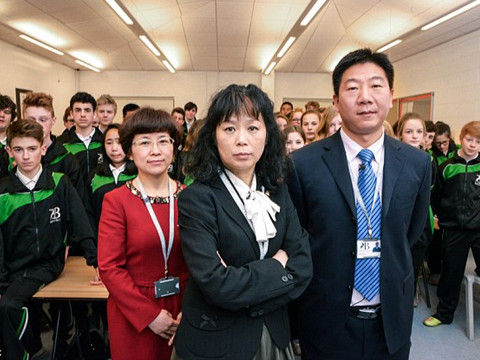BBC纪录片:当英国学生碰上中国老师

位于利普胡克的博航特中学拥有1600名学生,是英国顶尖的综合学校之一,坐落于地段繁华人来人往的村庄,该中学启动了一项大胆又激进的实验:邀请了五位来自中国重点学校的老师来教50名13-14岁的九年级学生,为期四周。
Why? Simple. British students lag three years behind their Asian counterparts in academic achievement. In maths, they trail behind most of Europe, too。
为什么要这样做?原因很简单。英国学生在学业成绩上和亚洲学生相比已经落后三年了,在数学上,他们也落后于欧洲大部分国家。
Keenly aware of this, and conscious that its pupils will be competing with the Chinese for jobs in a global market, the school set out to test how its students would fare under the rigour, long hours and rigid discipline of the Chinese education system。
他们不仅强烈意识到这一点,还意识到他们的学生将来要和中国学生在国际市场上竞争工作,于是这所学校打算测试一下它的学生会如何面对中国教育方法长时间的严格学习,及对纪律的严格要求。
The answer, it seems, is abysmally。
答案似乎不太妙。
The pupils subjected to the rigour of the Chinese system swiftly show signs of rebellion。
开始中国式教育之后,学生们很快就有了反抗迹象。
Compelled to adjust to 7 am starts, a 12-hour day, a remorseless homework schedule and all-ability classes with 50 pupils (the British system recommends no more than 30), plus a return to traditional teaching methods, their reaction is, by and large, to revolt。
50名学生(英国教育体制建议一个班不超过30人)被迫要从早上7点开始学习,每天学习12小时,面对着大量的家庭作业和全面学习,再加上传统的中国式教学法,他们大部分都表示抗拒。
The Chinese ethos — in which respect for authority and ruthless competition are key — could not be more remote from the child-centred learning in British schools, where pupils are encouraged to question and discuss, and the emphasis is on ‘self-discovery’. In Hampshire, Miss Yang has to control her class before she can teach them. In Asia, pupils accord her a reverential silence as she lectures them。
在中国民族精神中,尊师重道、残酷竞争是主流,和英国学校奉行的以孩子为中心的教学方法大相庭径,英国学校鼓励学生们问问题、互相讨论,强调要“发现自我”。在汉普郡,杨老师要在开始教学前先维持课堂秩序,而在亚洲,当她开始上课的时候学生们都会尊重她,保持课堂安静。
‘In China, teachers receive the respect of the children and they do as they’re told,’ she says. ‘Chinese students don’t waste other people’s time. In China, we don’t need classroom management skills because everyone is disciplined by nature, by families, by society. Here it is the most challenging part of teaching.’
“在中国,孩子们都很尊敬老师,老师怎么说,他们就怎么做,”她表示,“中国学生不会浪费别人的时间。在中国,我们没必要想办法管理班级,因为每个人都被自己、家庭以及社会要求守纪律。这点是教学中最具挑战性的部分。”
She is bemused when a girl leaves the classroom in tears after learning that singer Zayn Malik has left the boy band One Direction. ‘I find it difficult to understand such emotional behaviour over a pop band,’ she says, incredulous。
当一个女孩子为了泽恩·马利克离开单向乐队这件事哭着离开教室时,杨老师表示无法理解。“我很难理解为了一个流行乐队就如此激动的行为。”她觉得难以置信。
One of the teachers has a theory about poor behaviour in British schools: Wei Zhoa blames the ‘feather-bedding’ of our welfare state for promoting pupils’ lack of ambition and lax discipline. ‘Even if they (young adults) don’t work, they can get money, so they don’t worry about it,’ she tells me。
其中一位老师对英国学校里的糟糕表现进行推测:魏兆(音译)指责英国的福利制度创造了太过舒适的环境,使得学生们失去干劲,纪律松懈。“就算他们(学生们)不工作,他们也能拿到钱,所以他们根本就不在乎。”
‘But in China they can’t get these things, so they know: “I need to study hard, I need to work hard, to get money to support my family。” ’
“但是在中国,学生们没有这样的福利制度,所以他们知道:‘我得好好学习,努力工作,赚钱养家。’”
He says: ‘In China, it’s really difficult to get help if you lose your job, so you think really hard about making a living. You need to keep your job to get money. That’s the way of life。
他表示:“在中国,如果你失业了,你很难得到救助,所以你必须努力谋生。你必须要有工作,不然就没有钱,这就是在中国的生活方式。”
‘If the British Government really cut benefits down to force people to go to work, they might see things in a different way。
“如果英国政府削减福利,迫使人们去工作,他们可能就不会这样看待学习了。”


















